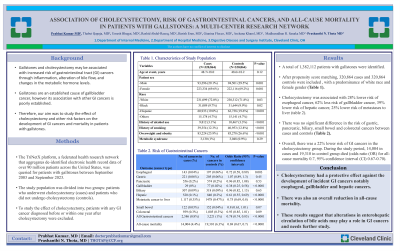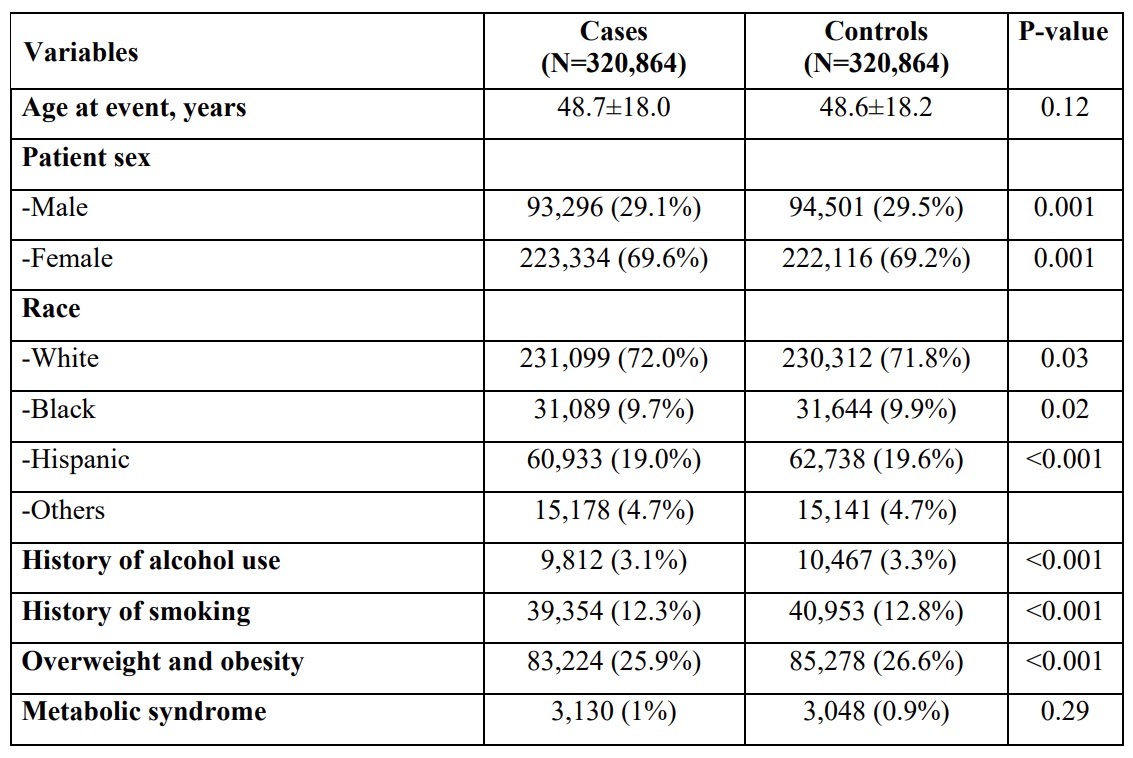Sunday Poster Session
Category: Biliary/Pancreas
P0069 - Association of Cholecystectomy, Risk of Gastrointestinal Cancers, and All-Cause Mortality in Patients with Gallstones: A Multi-Center Research Network
Sunday, October 27, 2024
3:30 PM - 7:00 PM ET
Location: Exhibit Hall E

Has Audio

Prabhat Kumar, MD
Cleveland Clinic Foundation
Richmond, VA
Presenting Author(s)
Prabhat Kumar, MD1, Thabet Qapaja, MD1, Umesh Bhagat, MD1, Rashid Abdel-Razeq, MD2, Barish Eren, MD1, Gianina Flocco, MD3, Archana Kharel, MD1, Madhusudhan R. Sanaka, MD1, Prashanthi N. Thota, MD1
1Cleveland Clinic Foundation, Cleveland, OH; 2Cleveland Clinic, Cleveland, OH; 3Cleveland Clinic Foundation, Fairview Park, OH
Introduction: Gallstones and cholecystectomy may be associated with increased risk of gastrointestinal tract (GI) cancers through inflammation, alteration of bile flow, and changes in the metabolic hormone levels. Gallstones are an established cause of gallbladder cancer, however its association with other GI cancers is poorly established. Therefore, our aim was to study the effect of cholecystectomy and other risk factors on the development of GI cancers and mortality in patients with gallstones.
Methods: The TriNetX platform, a federated health research network that aggregates de-identified electronic health record data of over 90 million patients across the United States, was queried for patients with gallstones between September 2003 and September 2023. The study population was divided into two groups: patients who underwent cholecystectomy (cases) and patients who did not undergo cholecystectomy (controls). To study the effect of cholecystectomy, patients with any GI cancer diagnosed before or within one year after cholecystectomy were excluded.
Results: A total of 1,382,112 patients with gallstones were identified. After propensity score matching, 320,864 cases and 320,864 controls were included with a predominance in white race and female gender (image). Cholecystectomy was associated with 28% lower risk of esophageal cancer, 62% less risk of gallbladder cancer, 39% lower risk of hepatic cancer, 25% lower risk of metastases to liver (table 2). There was no significant difference in the risk of gastric, pancreatic, biliary, small bowel and colorectal cancers between cases and controls (table). Overall, there was a 22% lower risk of GI cancers in the cholecystectomy group. During the study period, 14,004 in cases and 19,310 in control group died (odds ratio (OR) for all-cause mortality 0.7, 95% confidence interval (CI) 0.67-0.70).
Discussion: Cholecystectomy had a protective effect against the development of incident GI cancers notably esophageal, gallbladder and hepatic cancers. There was also an overall reduction in all-cause mortality. These results suggest that alterations in enterohepatic circulation of bile acids may play a role in GI cancers and needs further study.

Note: The table for this abstract can be viewed in the ePoster Gallery section of the ACG 2024 ePoster Site or in The American Journal of Gastroenterology's abstract supplement issue, both of which will be available starting October 27, 2024.
Disclosures:
Prabhat Kumar, MD1, Thabet Qapaja, MD1, Umesh Bhagat, MD1, Rashid Abdel-Razeq, MD2, Barish Eren, MD1, Gianina Flocco, MD3, Archana Kharel, MD1, Madhusudhan R. Sanaka, MD1, Prashanthi N. Thota, MD1. P0069 - Association of Cholecystectomy, Risk of Gastrointestinal Cancers, and All-Cause Mortality in Patients with Gallstones: A Multi-Center Research Network, ACG 2024 Annual Scientific Meeting Abstracts. Philadelphia, PA: American College of Gastroenterology.
1Cleveland Clinic Foundation, Cleveland, OH; 2Cleveland Clinic, Cleveland, OH; 3Cleveland Clinic Foundation, Fairview Park, OH
Introduction: Gallstones and cholecystectomy may be associated with increased risk of gastrointestinal tract (GI) cancers through inflammation, alteration of bile flow, and changes in the metabolic hormone levels. Gallstones are an established cause of gallbladder cancer, however its association with other GI cancers is poorly established. Therefore, our aim was to study the effect of cholecystectomy and other risk factors on the development of GI cancers and mortality in patients with gallstones.
Methods: The TriNetX platform, a federated health research network that aggregates de-identified electronic health record data of over 90 million patients across the United States, was queried for patients with gallstones between September 2003 and September 2023. The study population was divided into two groups: patients who underwent cholecystectomy (cases) and patients who did not undergo cholecystectomy (controls). To study the effect of cholecystectomy, patients with any GI cancer diagnosed before or within one year after cholecystectomy were excluded.
Results: A total of 1,382,112 patients with gallstones were identified. After propensity score matching, 320,864 cases and 320,864 controls were included with a predominance in white race and female gender (image). Cholecystectomy was associated with 28% lower risk of esophageal cancer, 62% less risk of gallbladder cancer, 39% lower risk of hepatic cancer, 25% lower risk of metastases to liver (table 2). There was no significant difference in the risk of gastric, pancreatic, biliary, small bowel and colorectal cancers between cases and controls (table). Overall, there was a 22% lower risk of GI cancers in the cholecystectomy group. During the study period, 14,004 in cases and 19,310 in control group died (odds ratio (OR) for all-cause mortality 0.7, 95% confidence interval (CI) 0.67-0.70).
Discussion: Cholecystectomy had a protective effect against the development of incident GI cancers notably esophageal, gallbladder and hepatic cancers. There was also an overall reduction in all-cause mortality. These results suggest that alterations in enterohepatic circulation of bile acids may play a role in GI cancers and needs further study.

Figure: Image: Characteristics of Study Population
Note: The table for this abstract can be viewed in the ePoster Gallery section of the ACG 2024 ePoster Site or in The American Journal of Gastroenterology's abstract supplement issue, both of which will be available starting October 27, 2024.
Disclosures:
Prabhat Kumar indicated no relevant financial relationships.
Thabet Qapaja indicated no relevant financial relationships.
Umesh Bhagat indicated no relevant financial relationships.
Rashid Abdel-Razeq indicated no relevant financial relationships.
Barish Eren indicated no relevant financial relationships.
Gianina Flocco indicated no relevant financial relationships.
Archana Kharel indicated no relevant financial relationships.
Madhusudhan R. Sanaka indicated no relevant financial relationships.
Prashanthi Thota indicated no relevant financial relationships.
Prabhat Kumar, MD1, Thabet Qapaja, MD1, Umesh Bhagat, MD1, Rashid Abdel-Razeq, MD2, Barish Eren, MD1, Gianina Flocco, MD3, Archana Kharel, MD1, Madhusudhan R. Sanaka, MD1, Prashanthi N. Thota, MD1. P0069 - Association of Cholecystectomy, Risk of Gastrointestinal Cancers, and All-Cause Mortality in Patients with Gallstones: A Multi-Center Research Network, ACG 2024 Annual Scientific Meeting Abstracts. Philadelphia, PA: American College of Gastroenterology.
